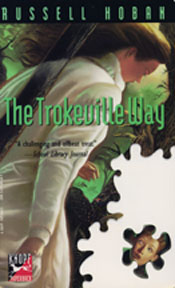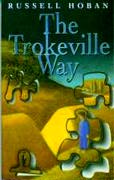Back to The Head of Orpheus: a Russell Hoban Reference Page (home).
"I feel morally obliged to tell you one thing, though--you get into that picture and you'll wish you were out of it."
"Why?"
"Life is like that, isn't it. You get into something and you wish you were out of it."
--The Trokeville Way, (p. 20)

Knopf US Edition |
The Trokeville Way (1996)
A novel for young adults
by Russell Hoban
AWARDS:
Shortlisted for Guardian Children's Fiction Prize and Whitbread Children's Book of the Year 1996
EDITIONS I KNOW OF:
- (UK) Paperback - Puffin Books, 117. pp.
- (US) Paperback - Alfred A. Knopf, Inc. (Random House), 117 pp.
DESCRIPTION:Twelve-year-old Nick Hartley has a big problem--a bully named Harry Buncher. At the book's opening, Nick loses his third schoolyard fight with Buncher, and winds up with a bloody face, a bump on the head, and a strange, heightened-senses kind of feeling. Nick spends the rest of the day ruminating on the difference between winning and losing; then, on his way home from school, he encounters a strange, "sad and mysterious" man busking with a concertina on the sidewalk.
The busker turns out to be a washed-up stage magician named Moe Nagic, and he has something for sale: a watercolor painting bearing the words "THE TROKEVILLE WAY," which has been carved up into a jigsaw puzzle. It's a picture of a stone bridge (or "brudge", as Moe calls it, because it looks like a bridge with a grudge), with a little river running underneath it and two shadowy figures standing on it. Nick tells us that "the whole scene was full of that light you get before a thunderstorm...everything seemed to be waiting." After some suitably oblique conversation, Moe reveals to Nick that the painting is actually a kind of gateway to another reality: by spinning a gyroscope and leaning into the picture, it's possible to actually enter the scene.
You might expect, with that kind of a setup, for the land inside the painting to be some kind of enchanted fairyland where Nick has magical, heroic adventures. But the place inside Moe Nagic's puzzle (or "juzzle," as Nagic insists it should be called) is nobody's Narnia: it's a disturbing, ominous place where even the water under the brudge is dark and foul-smelling. Yet Nick hardly hesitates to step inside; on some level, he understands he has business to take care of there.

Puffin UK Edition |
Moe sells Nick the juzzle for two pounds forty-two, and then drops out of the picture himself, leaving Nick alone to try to accomplish what Moe says he never could: finding his way to the brightly lit town called Trokeville. Trokeville itself isn't even visible from outside the juzzle: to get there you have to make your way from the brudge, through the "little would" (a haunted forest in which Nick finds his mother and father wandering lost), and beyond it, the "mise" (a mysterious, erotically-charged labyrinth where nothing happens quite the way you'd expect).
Though it's disguised as a kind of dark fairy tale, The Trokeville Way is really an allegory about the passage into adulthood: a ritual of initiation into the fears, confusion, regrets and mysteries that ensnare and challenge adults. Along the way Nick gains new understandings--perhaps a little more at times than he'd like to know--about the lives of his parents, his teachers, his peers, and the misfortunate Moe. And about how it comes to pass that adults sometimes wind up feeling more like losers than winners.
Much of Nick's adventures (or misadventures) inside the juzzle involve confronting his nemesis Harry Buncher, whom he must learn to face. Mr. Hoban skillfully makes the point that sometimes courage comes from being angry enough to stop fearing the consequences of one's actions; but the way Nick ultimately settles accounts with Harry Buncher seems unnecessarily violent to me. I wish that somewhere along the way Nick had discovered the courage to walk away from a fight. I would have rather seen him learn that you can face a bully down without descending to his level, than end the book believing that courage consists of beating somebody else to a pulp.
Nonetheless, The Trokeville Way is a powerful and ingenious encapsulation of the difficult passage into adulthood--a reasonable facsimile of the handbook we all should have been issued at puberty, and weren't. And although the book is marketed to a young adult readership, I'll venture that adult readers with a little bit of living behind them will best be able to recognize, and relate to, what's really going on inside the juzzle.
NOTES:
 The Trokeville Way was published in 1996, the same year as Fremder; and there are some interesting overlapping themes. Both Nick Hartley and Fremder Gorn have ongoing confrontations with schoolyard bullies; and both hold conversations with their own minds. Or rather, a mental voice that each character thinks of as his mind, but isn't quite the same as his regular consciousness--it speaks in all capital letters, and seems to know more than it lets on. As Fremder puts it, "I knew even then that it wasn't my mind in the same way that my brain was my brain: this was a mind that was here long before I arrived on the scene and it would be here long after I was gone."
The Trokeville Way was published in 1996, the same year as Fremder; and there are some interesting overlapping themes. Both Nick Hartley and Fremder Gorn have ongoing confrontations with schoolyard bullies; and both hold conversations with their own minds. Or rather, a mental voice that each character thinks of as his mind, but isn't quite the same as his regular consciousness--it speaks in all capital letters, and seems to know more than it lets on. As Fremder puts it, "I knew even then that it wasn't my mind in the same way that my brain was my brain: this was a mind that was here long before I arrived on the scene and it would be here long after I was gone."
REVIEW QUOTES:
"A tense tale of psychological manipulation and testing."
--The New York Times Book Review
"Packs a powerful, creepy punch. The discordant atmosphere of the puzzle-world is compellingly evoked...a fascinating and thoroughly worthwhile read."
--Victoria Strauss, SF Site
OTHER REVIEWS AND ARTICLES:
MEMORABLE LINES AND PASSAGES:
NICE WOMAN, YOUR MOTHER, said my mind.
Yes, I said, she is. But you know, I'd just as soon not have any family here in the juzzle world. I almost can't remember anymore how this whole thing started but I know I wanted it to be separate from everything else.
YOU'RE ALMOST THIRTEEN, NICK. YOU'RE OLD ENOUGH TO UNDERSTAND WHAT I'M GOING TO TELL YOU.
What?
THERE ARE NO SEPARATE THINGS. (p. 76)
"Pain is something that's always there, like gravity." (p. 85)
"I feel morally obliged to tell you one thing, though--you get into that picture and you'll wish you were out of it."
"Why?"
"Life is like that, isn't it. You get into something and you wish you were out of it."
Back to The Head of Orpheus: a Russell Hoban Reference Page (home page).
A Complete list of Russell Hoban's books for kids
Russell Hoban's other novels and collections:
|


 The Trokeville Way was published in 1996, the same year as Fremder; and there are some interesting overlapping themes. Both Nick Hartley and Fremder Gorn have ongoing confrontations with schoolyard bullies; and both hold conversations with their own minds. Or rather, a mental voice that each character thinks of as his mind, but isn't quite the same as his regular consciousness--it speaks in all capital letters, and seems to know more than it lets on. As Fremder puts it, "I knew even then that it wasn't my mind in the same way that my brain was my brain: this was a mind that was here long before I arrived on the scene and it would be here long after I was gone."
The Trokeville Way was published in 1996, the same year as Fremder; and there are some interesting overlapping themes. Both Nick Hartley and Fremder Gorn have ongoing confrontations with schoolyard bullies; and both hold conversations with their own minds. Or rather, a mental voice that each character thinks of as his mind, but isn't quite the same as his regular consciousness--it speaks in all capital letters, and seems to know more than it lets on. As Fremder puts it, "I knew even then that it wasn't my mind in the same way that my brain was my brain: this was a mind that was here long before I arrived on the scene and it would be here long after I was gone."